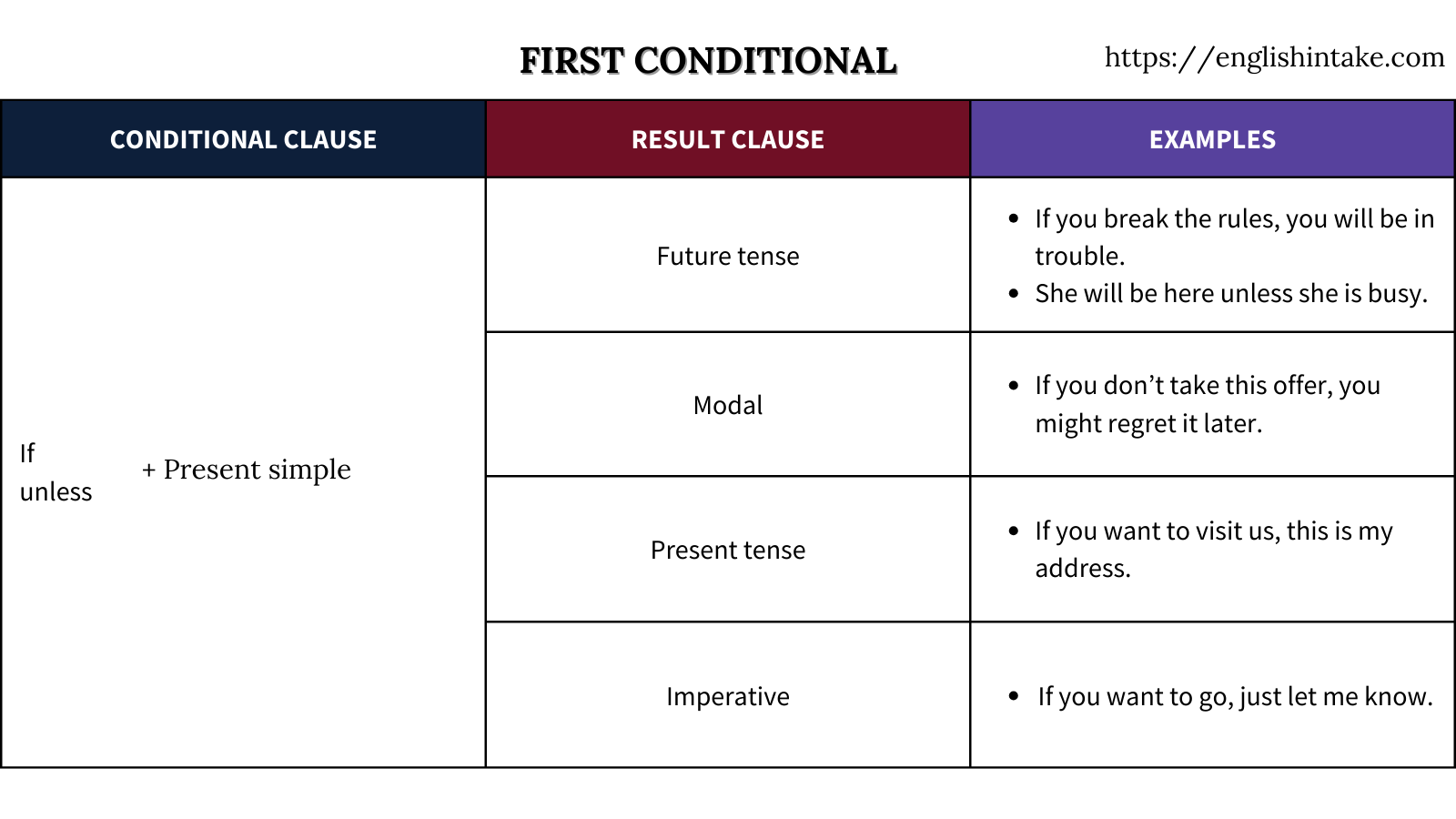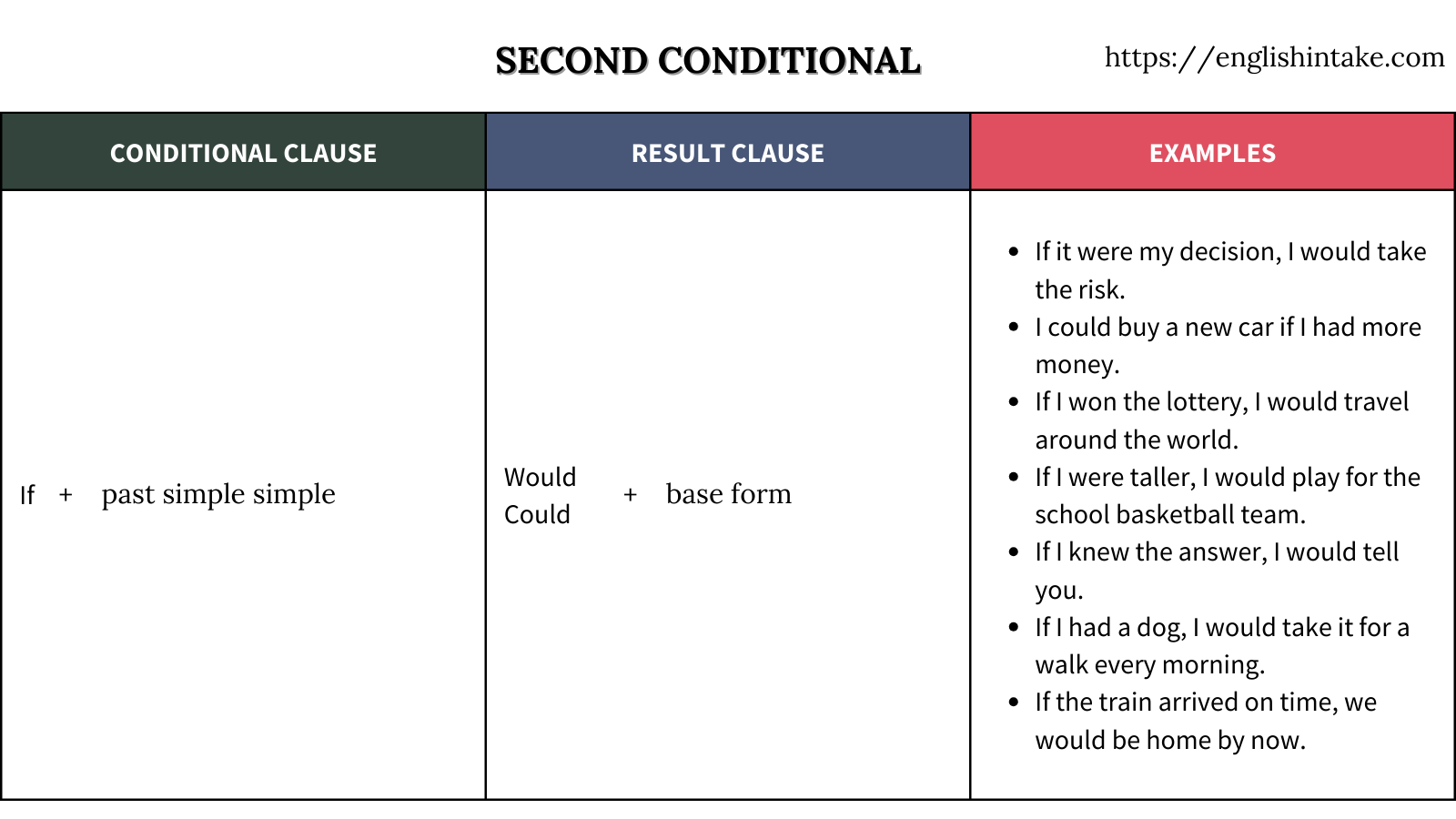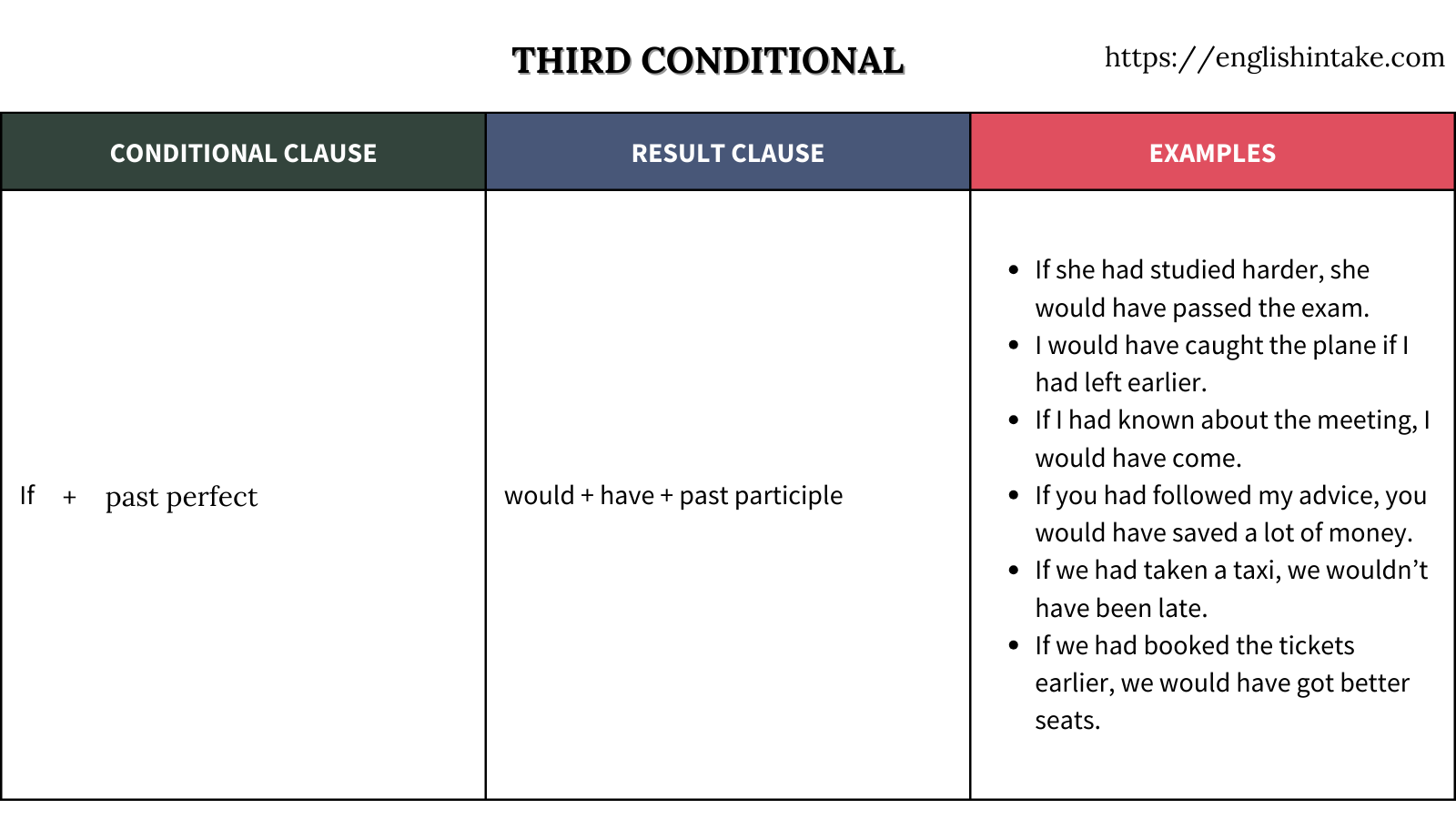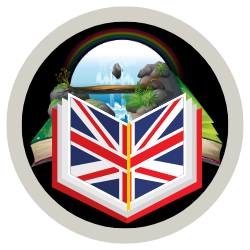1. What are conditionals in English?
Conditionals or if clauses are complex sentence structures used to express that if something happens or happened, something else might happen or might have happened as a result. Conditional sentences are formed by two clauses: an if clause and a main clause, where the if clause states the condition and the main clause expresses the possible result or outcome. There are five types of conditionals in English:
- Zero conditional, also known as type 0 conditional or present real conditional
- First conditional, also called type 1 conditional or future real conditional
- Second conditional, sometimes referred to as type 1 conditional or present unreal conditional
- Third conditional, often known as type 1 conditional or past unreal conditional
- Fourth conditional, often referred to as mixed type conditional
The table below illustrates the different structures of conditional sentences in English depending on the type of condition and the time frame being discussed.
2. If clause rules
| If clause | Main clause | Use |
|---|---|---|
| Zero conditional | ||
| If + Present simple | Present simple | General truths or facts, i.e., situations that are always true. |
| Type 1 conditional | ||
| If + Simple present | Simple future | Real or likely situations in the future and their probable consequences. |
| Type 2 conditional | ||
| If + Simple past | Present conditional or present continuous conditional | Unreal or hypothetical situations in the present or future. |
| Type 3 conditional | ||
| If + Past perfect | Perfect conditional | Hypothetical situations in the past and their imagined (past) consequences. |
| Mixed type conditional or fourth conditional | ||
| If + Past perfect or past simple | Present conditional or perfect conditional | Past hypothetical conditions and their consequences in the present. |
3. Zero conditional
The zero conditional expresses general truths or facts where the result is always the same when the condition is met. In this structure, both the conditional clause (if clause) and the main clause are written in the present simple tense. The conditional clause states the condition, and the main clause gives the result, which is inevitable when the condition occurs.
- If you heat water, it boils.
- If you mix blue and yellow, you get green.
- If the sun sets, it becomes dark.
- If you touch fire, your hand burns.
- If I drink coffee at night, I can't sleep.
- If she feels tired, she takes a nap.
- If babies are hungry, they cry.
- If people don’t eat enough food, they get hungry.
- If ice melts, it turns into water.
- The machine starts if you press this button.
- If you plant a seed, it grows.
- If you stay in the sun too long, you get sunburned.
- Animals die if they don’t eat.
- If you freeze water, it becomes ice.
- If you pour oil on water, it floats.
- If plants don't get enough water, they wilt.
- If food spoils, it smells bad.
- If it’s hot, people sweat.
- If a dog barks, it makes noise.
- If the wind blows, leaves move.
- If you throw something up, it comes down.
- If people don’t get enough sleep, they feel sleepy.
- If you cut your finger, it bleeds.
- If you overcook pasta, it becomes mushy.
- If you hit the brakes, the car stops.
4. First conditional
The first conditional talks about real and possible situations in the future that depend on a certain condition. The first conditional sentences are often used to give warnings in case the condition in the if clause is met.

- If it rains tomorrow, I will stay home.
- If you call me, I will answer.
- If you drive too fast, you will be fined.
- If it’s sunny tomorrow, we will go to the park.
- If she doesn't come by 11 a.m., I will leave.
- If you hurry, you will catch the bus.
- If you tell me the truth, I will forgive you.
- If you try harder, you will succeed.
- If I find your keys, I will give them to you.
- If you study well, you will pass the test.
- If I have time, I will help you.
- We will be on time if we leave now.
- You will learn something new if you read that book.
- He will get a promotion if he works hard.
- If she visits me, I will be happy.
- If you break the rules, you will be in trouble.
- If you study hard, you will understand the topic.
- If you listen carefully, you will hear the birds sing.
- I will go to the party if she invites me.
- If I don’t find my keys, I will be late.
- If he doesn’t arrive by 11 a.m., we will start without him.
- If you apologise, I will forgive you.
- If it rains later, the game will be cancelled.
- If he doesn’t hurry, he will miss the bus.
- I will let you know If the meeting is cancelled.
5. Second conditional
The Second Conditional expresses unreal or hypothetical situations in the present or future. Second conditional sentences describe situations that are unlikely to happen or are purely imaginary. They are useful for expressing ideas about what could happen if things were different, often focusing on desires or imagined scenarios that are not grounded in reality. Let’s look at the if clause examples below to illustrate its use.

- If I won the lottery, I would buy a house.
- If they had more time, they would travel the world.
- If I were taller, I would play basketball.
- If I were you, I wouldn’t br1eak up with her.
- If I could fly, I would visit every country.
- If I were rich, I would donate to charity.
- If you were in my shoes, what would you do?
- If I were the president, I would change the law.
- If he were here, he would help us.
- If you were a superhero, what would you do?
- If I could choose, I would live by the ocean.
- If I had a magic wand, I would make everyone happy.
- If I were a celebrity, I would use my influence to promote education.
- If I could change one thing on earth, I would eliminate war.
- If I had a bicycle, I would ride it every day.
- If I could live anywhere, I would choose a quiet town.
- If it were my decision, I would take the risk.
- If I had the opportunity, I would try skydiving.
- She wouldn’t feel lonely if she had a partner.
- If I had the power, I would overthrow the president.
- Would you save her if she were kidnapped?
- Would you stay by my side if I lost everything?
6. Third conditional
The third conditional expresses hypothetical situations in the past that did not happen. It expresses how things could have been different if certain conditions had been met. Third conditional sentences often express regrets, criticisms, or reflections on past events, emphasising that the condition was not fulfilled and, therefore, the result did not occur.

- If I had known about the party, I would have gone.
- If she had studied harder, she would have passed the exam.
- If they had left earlier, they would have caught the train.
- If they had practiced more, they would have won the match.
- If I had seen you at the concert, I would have said hello.
- If you had told me, I would have helped you.
- If I had known it was your birthday, I would have bought a gift.
- If we had known about the traffic, we would have left earlier.
- If he had been more careful, he would not have made that mistake.
- If I had met her earlier, we would have been married.
- If he had taken his coach's advice, you would have won the match.
- If they had been more organised, they would have finished on time.
- If I had chosen a different path, my life would have been different.
- If I had taken the train, I would have arrived earlier.
- If I had known the truth, I would have acted differently.
- If I had heard the news earlier, I would have reacted differently.
- If he had listened to his parents, he would have avoided trouble.
- If she had done her research, she would have made a better presentation.
- They could have bought a bigger house if they had saved more money.
- If we had taken the other route, we would have avoided the traffic jam.
7. Mixed type conditional sentences
Mixed type conditional sentences combine elements from different types of conditionals to express a situation where a past action affects a present circumstance. They highlight how an unreal condition from the past leads to a current result that may be contrary to reality. This structure allows speakers to explore hypothetical scenarios that connect the past to the present in a meaningful way.
- If I had studied harder, I would have a degree now.
- If he hadn’t missed the bus, he would be at the office already.
- If we had planned the trip better, we wouldn’t be lost.
- If you had asked for directions, we wouldn’t be wandering around.
- If she had accepted the offer, she would have a better position now.
- If they had built the bridge last year, people wouldn't be stuck in traffic today.
- If you weren’t so shy, you would have asked him out.
- If he hadn’t broken his leg, he would be playing football right now.
- If we had known about the traffic, we would have taken another route.
- If she had apologized, we would still be friends now.
- If I had taken that opportunity, my life would be very different today.
- If they had been more responsible, they wouldn’t have these problems now.
8. Common mistakes while constructing conditional sentences
In the second conditional, the correct form is "If I were" or "he/she/it were", especially in formal English. This is because "were" is used as the subjunctive mood, which expresses hypothetical or unreal situations. For example,
- If I were rich, I would travel the world.
- If he were here, he would help us.
You may here some native speakers say "If I was", though it's not grammatically correct.
When constructing conditional sentences, it's essential to follow certain rules for verb usage. In the conditional clause (the part that starts with "if"), avoid using "will" or "would." Here are some examples:
- Correct: If you leave early, you will catch the bus.
- Incorrect: If you will leave early, you will catch the bus.
- Correct: If I knew the answer, I would tell you.
- Incorrect: If I would know the answer, I would tell you.
- Correct: If they had finished on time, we could have gone to the movie.
- Incorrect: If they would have finished on time, we could have gone to the movie.
For second conditional sentences, do not use "shall" or "will" in the main clause. Instead, use "would" or "could":
- Correct: If you saved more money, you would have more for emergencies.
- Incorrect: If you saved more money, you will have more for emergencies.
Finally, do not use "unless" and "if" together. "Unless" already implies a condition, so adding "if" is redundant:
- Correct: I’ll come at 6 unless you prefer a later time.
- Incorrect: I’ll come at 6 unless if you prefer a later time.

